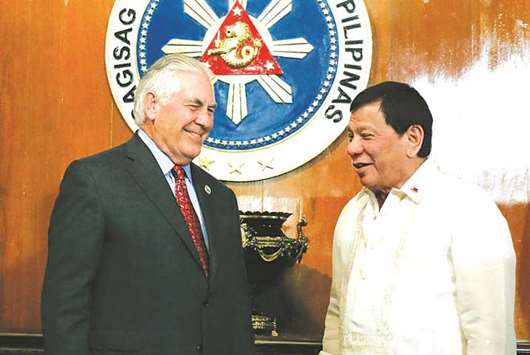US Secretary of State Rex Tillerson brushed aside questions about the Philippines’ deadly drug war yesterday as he received a warm welcome from President Rodrigo Duterte.
Duterte’s 13-month-old administration has launched a brutal crackdown on drugs that has claimed thousands of lives and led to warnings by rights groups that he may be overseeing a crime against humanity.
But Washington fears offending its long-time ally could push it into the arms of US rival China, and it is backing Philippine troops as they battle to recapture part of a southern region occupied by militants aligned to the Islamic State group.
When Duterte welcomed Tillerson to his palace yesterday the pair ignored reporters’ questions about human rights, and afterwards the Philippine leader insisted the topic had not come up at the talks.
“They did not,” Duterte replied when asked if US officials raised human rights during the discussions.
Last week, before Tillerson travelled to Manila to attend meetings with fellow foreign ministers at a regional diplomatic and security forum, US officials said he would raise the issue of the drug war.
But, just before the meeting, Tillerson denied there was any tension between Washington’s support for the fight against the Islamic State group and concerns about the alleged extra-judicial killings.
Tillerson described the crisis in the southern Philippine city of Marawi as a “tragic situation” and said US forces were providing surveillance aircraft and important advice for the Philippines forces in the battle there.
“Bringing our knowledge in how to deal with this enemy in other parts of the world is useful to them, and I think that is also in our security interests as well,” he told US journalists at his hotel.
“I see no conflict at all in our helping them with that situation, and our views on other human rights concerns that we have in how they carry out their counter-narcotics activities.”
Duterte easily won presidential elections last year after promising an unprecedented war on drugs in which tens of thousands of people would be killed.
Since he took office in the middle of last year, police have confirmed killing more than 3,400 people in anti-drug operations.
More than 2,000 other people have been killed in drug-related crimes and thousands more murdered in unexplained circumstances, according to police data.
Rights groups say many of those victims have been killed by government-backed vigilantes, and Duterte has himself boasted that he would be “happy to slaughter” 3mn drug addicts.
Former US president Barack Obama was among the many international critics of the drug war. Duterte, who frequently uses coarse language against his critics, responded by swearing at Obama last year.
Duterte also used the criticism as justification for loosening the Philippines’ decades-long alliance with the United States in favour of warmer ties with China.
Australia, Japan and the United States yesterday urged Southeast Asia and China to ensure that a South China Sea code of conduct they have committed to draw up will be legally binding and said they strongly opposed “coercive unilateral actions”.
The Association of South East Asian Nations (Asean) and China should establish a set of rules that were “legally binding, meaningful, effective, and consistent with international law”, the foreign ministers of the three countries said in a statement following a meeting in Manila.
Foreign ministers of Asean and China on Sunday adopted a negotiating framework for a code of conduct, a move they hailed as progress but seen by critics as a tactic to buy China time to consolidate its maritime power.
Australia, Japan and the United States also “voiced their strong opposition to coercive unilateral actions that could alter the status quo and increase tensions”.
They urged claimants to refrain from land reclamation, construction of outposts and militarisation of disputed features, a veiled reference to China’s expansion of its defence capability on Mischief, Fiery Cross and Subi reefs in the Spratly archipelago.
The three countries are not claimants but have long been vocal on the issue, arguing their interest is in ensuring freedom of navigation and overflight.
They urged China and the Philippines to abide by last year’s international arbitration ruling, which invalidated China’s claim to almost the entire South China Sea, where more than $3tn worth of sea-borne goods passes every year.
Brunei, Malaysia, the Philippines, Taiwan and Vietnam also have competing claims there.
The code framework is an outline for what China and Asean call “consultations” on a formal agreement, which could start later this year.
Several Asean countries want the code to be legally binding, enforceable and have a dispute resolution mechanism.
But experts say China will not allow that and Asean may end up acquiescing to what amounts to a gentlemen’s agreement.
Chinese Foreign Minister Wang Yi said there was a “sharp contrast” in perceptions this year between regional and non-regional countries, and the statement by Japan, the United States and Australia showed that.
Coastal countries had “fully recognised the progress we have made through concerted efforts from all parties”, he said.
“On the other hand, some non-regional countries remain in the past... They are not recognising the positive changes occurring in the South China Sea.
“Is it that some countries do not want to see greater stability in the South China Sea?” he asked.
Singapore’s foreign minister, Vivian Balakrishnan, said on Sunday it was premature to conclude the outcome of the negotiations, but added: “Surely when we move into the COC, it has got to have some additional or significant legal effect.”
Jay Batongbacal, an expert on the South China Sea at the University of the Philippines, told news channel ANC the adoption of the framework gave China “the absolute upper hand” in terms of strategy, because it will be able to decide when the negotiating process can start.

President Duterte meets US Secretary of State Tillerson in Manila.
